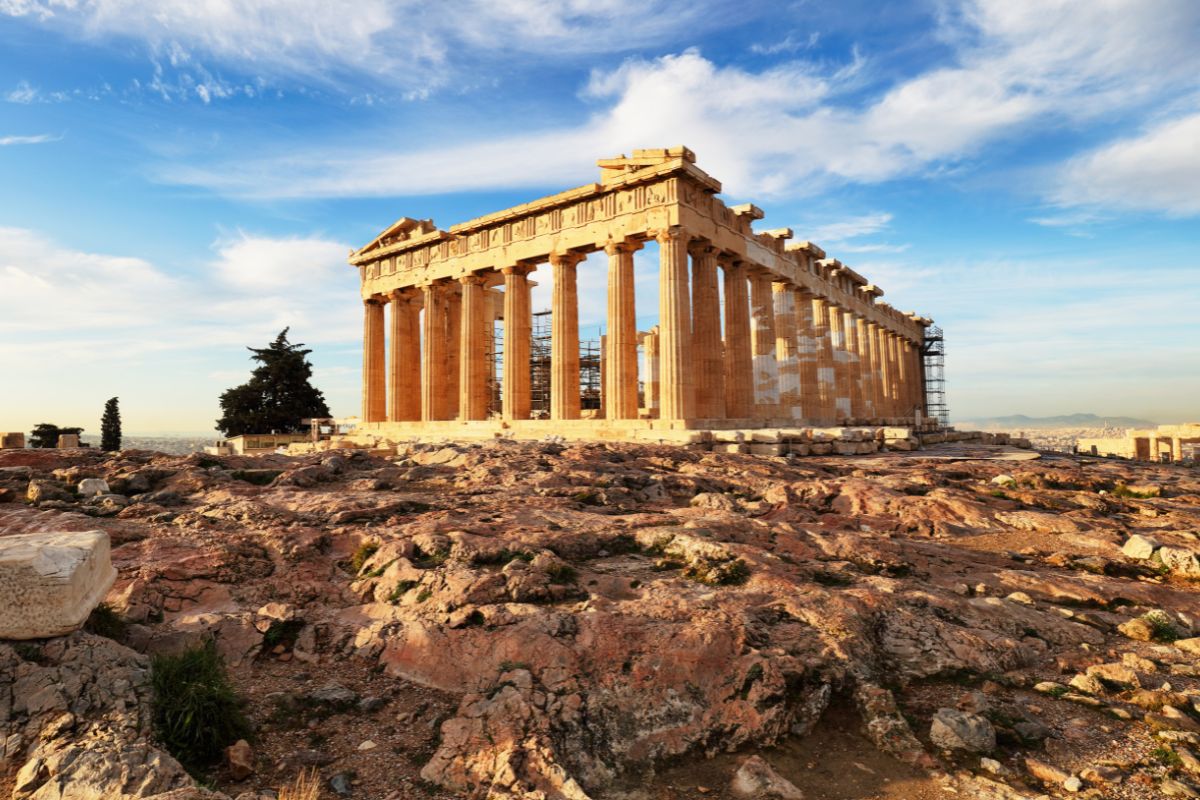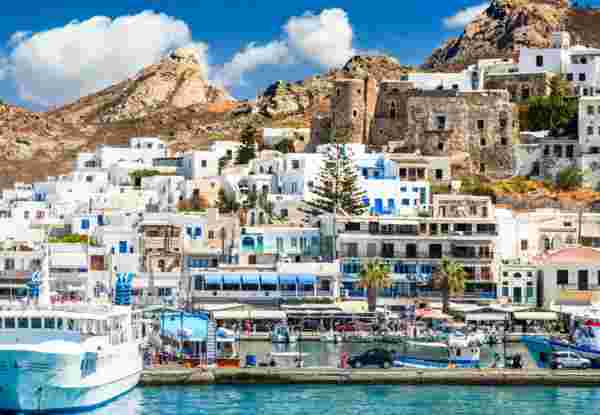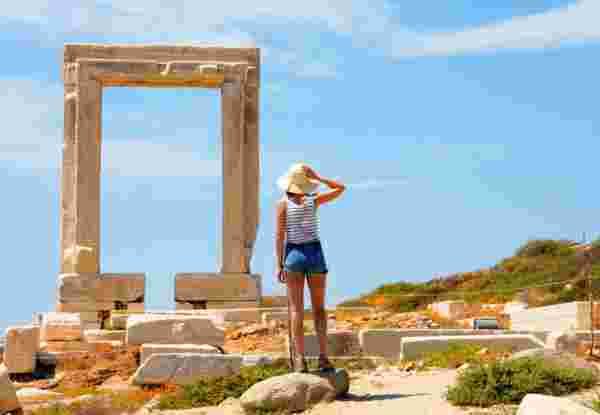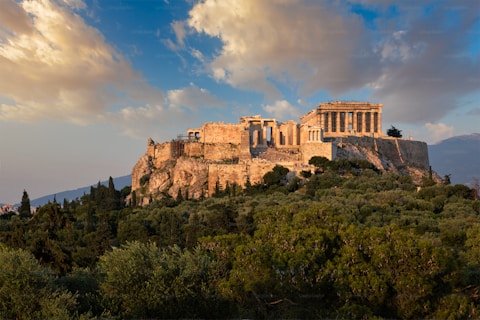2 Weeks in Greece (14 day itinerary): The Ultimate Travel Guide

Are you dreaming of a Greece itinerary that mixes ancient history, beautiful Greek islands, and lively culture? This easy 2 Weeks in Greece guide will help you plan an amazing two weeks in Greece. It’s perfect for first-time travelers who want to check off their bucket list places.
Getting Started with Your Greek Adventure
Embarking on a two-week adventure in Greece is exciting. You will see ancient ruins and famous museums. The sunny beaches of the Aegean Sea will welcome you too. To enjoy your time, you need to know about the geography and culture.
This guide will help you understand how to explore this lovely country. It will make your journey through Greece easier and more enjoyable. Get ready to be amazed by its beauty and experience all the magic it has to offer.
Understanding Greece’s Geography and Culture
Greece has a long coastline and many islands that will take your breath away. The land is full of steep mountains, rich valleys, and old historical sites. Explore the Greek islands, each with its special character. You can enjoy the beautiful white homes and volcanic beauty in Santorini, relax in the easy-going charm of Naxos, or explore the green hills of Crete. Greek culture is filled with a rich history. You can see this in the many old archaeological sites across the country. Learn about the ancient Greeks, their stories, thoughts, and art. Food is also important in Greek life. Don’t miss trying traditional dishes made with tasty olive oil, fresh veggies, and local herbs.
Best Times to Visit Greece for Different Activities
The best time to visit Greece and plan your trip depends on what you like. If you enjoy the sun and outdoor activities, the summer months from June to September are great. During this time, it gets very hot, which is perfect for swimming, sunbathing, and doing watersports. However, it is also the busiest season, so there will be more people and prices will be higher.
If you want cooler weather and fewer crowds, spring (April-May) and fall (September-October) are better. This is a great time to explore historical sites because the weather is nice. You can walk through old ruins without the heat of summer. In spring, you will see wildflowers blooming, which makes the views very colorful. In autumn, the temperatures are good for hiking and discovery.
Preparing for Your Trip
Before you travel to Greece, it’s important to plan carefully. This will help make your trip easier and more fun. First, gather all your essential documents and make necessary travel plans. If it’s your first time to Greece, get your visa or residency permit ahead of time to avoid problems with the Greek rules. Also, think about travel insurance, changing money, and packing for Greece’s warm weather and the activities you want to do. Don’t forget to check for any travel warnings or health advice before you leave.
Essential Documents and Requirements for U.S. Travelers
U.S. citizens who want to go to Greece for a two-week trip do not need a visa. You must have a valid passport. It should have at least six months left before it expires from your planned return date. As a first-time visitor, make sure you have a return ticket. This ticket will confirm when you plan to leave Greece. Although not required, travel insurance is a good idea. It can help with unexpected things like medical emergencies, trip cancellations, or lost bags. Travel insurance gives you financial protection and peace of mind while you are away.
Budgeting for 2 Weeks in Greece
When planning for 2 weeks in Greece, budgeting efficiently is crucial. Accommodation costs vary depending on the season and location, with island resorts typically more expensive. Opt for local tavernas for affordable meals and get lost in the Greek culinary experience. Transportation expenses will include ferries between islands and possibly a rental car for exploring. Consider purchasing a Greece tourist pass for access to multiple attractions. Set aside a budget for guided tours at archaeological sites, offering enriching experiences. Allocate funds for shopping for souvenirs in vibrant markets. Plan for unexpected expenses and keep some cash handy for emergencies. By budgeting wisely, you can make the most of your Greek adventure without overspending.
Credit Cards Use in Greece
Major credit cards like Visa and Mastercard are accepted in Greece. You will find this, especially in cities, hotels, restaurants, and stores. However, it is smart to have some cash (Euros) with you. Smaller businesses, local markets, and transit options might not take cards.
Tell your bank about your travel dates. This helps to avoid problems using your card while abroad. It is also a good idea to let them know if you will make large purchases or use your card in less touristy spots. Be sure to ask about fees for foreign transactions and ATM withdrawals to avoid surprises.
Withdrawing larger amounts of cash in one go is usually best. This can help reduce transaction fees. Having enough cash is useful, especially if you visit smaller islands or areas where ATMs might be hard to find.
A Beginner’s Guide to Exploring Greece
Navigating Greece for first-time visitors can be fun and exciting. A little preparation makes it even better. Learn about local transportation, including ferries and taxis. This way, you can travel around the mainland and islands easily. Also, knowing some basic Greek phrases can improve your interactions with people. It shows that you respect their culture. Enjoy the chance to meet locals, try the delicious food, and dive into the lively traditions that make Greece unique.
Overview of Transportation Options in Greece
Greece has many ways to get around the mainland and its lovely islands. Greek ferries are a great choice for traveling between islands. They run often and connect popular spots. If you want to explore the mainland or the islands, you might think about renting a car. This lets you go where you want at your speed, and it helps you find places less visited. Just keep in mind there may be traffic and parking issues in big cities. Taxis are easy to find in cities. They are a good choice for short trips. Public transport, like buses and the metro in Athens, is a cheap way to travel. This is especially helpful for people on a budget.
Language Tips and Basic Greek Phrases for Travelers
While many people speak English in tourist spots, learning a few basic Greek phrases can improve your time with locals. It shows that you respect their culture. Start with simple greetings like “Yassas” (Hello) and “Efharisto” (Thank you).
When you order food, using “Parakalo” (Please) and “Signomi” (Excuse me) can be helpful. Don’t be afraid to try these phrases. Greeks like it when you make an effort! You can also download a translation app on your phone. This will help you with more difficult conversations. These easy language tips will make your trip better and help you enjoy Greek hospitality.
Step-by-Step Guide to Planning Your 2 Weeks in Greece
Let’s plan your amazing 2-week trip to Greece. We will create a schedule that helps you see the best parts of Greece. This includes the history of Athens, the stunning views in Santorini, and the lovely islands like Naxos or Paros. You can change this plan to match what you like. Feel free to spend more time in places that interest you or switch some islands with others you wish to visit.
Step 1: Starting Your Journey in Athens
Your Greek journey starts in Athens. This city mixes ancient history with modern life. Your first stop should be the Acropolis. This site is a UNESCO World Heritage location and has stunning buildings like the Parthenon. Feel the lively energy of the city as you wander through the Plaka district. This area has beautiful streets, traditional tavernas, and shops where you can find souvenirs. In the evenings, enjoy tasty Greek dishes at rooftop restaurants. These places offer amazing views of the Acropolis lit up at night. The best way to explore Athens is on foot. You can find hidden gems and cozy cafes as you walk around.
Step 2: Discovering the Ancient Ruins and Museums
While the Acropolis is a must-see, Athens has many other important ancient ruins and famous museums. You can explore history at the Ancient Agora, which was the heart of Athenian democracy. Don’t miss the well-preserved Temple of Hephaestus as well.
You should also visit the archaeological site of the Temple of Olympian Zeus. It is dedicated to the king of the Olympian gods, and you can picture how grand it used to be. To learn more about ancient Greece, go to the Acropolis Museum. It has many artifacts from the Acropolis itself. Other important museums include the National Archaeological Museum, which has items from different times in Greek history. The Benaki Museum shows a wide range of Greek art and artifacts.
Step 3: Heading to Santorini for Breathtaking Views
No trip to Greece is complete without seeing the beauty of Santorini. This place is known for its white villages that sit on high volcanic cliffs. Do you find yourself wondering what to do in Santorini? Well you can enjoy stunning views of the Aegean Sea. The sunset over the caldera is famous and will take your breath away.
During the day, explore the lovely villages of Oia and Fira. These places are known for their pretty sights and small shops. You can swim in the Aegean Sea, relax on beaches with black or red sand, and enjoy tasty meals at restaurants with views of the caldera. If you want a different view of the island, you can go on a boat tour. This will give you amazing views of the caldera cliffs and a chance to swim in volcanic hot springs.
Step 4: Exploring the Beaches and Villages of Naxos or Paros
After experiencing the bright colors of Santorini, you can relax on the calm islands of Naxos or Paros. Both islands have a slower way of living. They are famous for their charming villages, beautiful beaches, and real Greek atmosphere.
Naxos is the biggest island in the Cyclades. It has beautiful beaches, old ruins, and a lovely main town with a Venetian castle.
Paros is known for its traditional villages and white houses. It is perfect for people who enjoy water sports or want to relax by the Aegean Sea. You can explore the charming villages, taste local food, and enjoy the sun on clean beaches.
Step 5: Experiencing the Rich History of Crete or Rhodes
For a better look at history, think about visiting Crete or Rhodes. Both islands have a rich history that goes back to ancient times. They feature old sites, medieval buildings, and beautiful natural views.
Crete is the biggest Greek island. It holds the legacy of the Minoan civilization. The Palace of Knossos shows their strong architectural skills. You can visit the Samaria Gorge, which is a UNESCO Biosphere Reserve, and enjoy some delicious Cretan food.
Rhodes is famous for its medieval Old Town, a UNESCO World Heritage site. It gives a peek into its Crusader history. You can explore the Palace of the Grand Masters, wander through the cobbled streets, and chill on the island’s beautiful beaches.
Step 6: Returning to Athens for Final Adventures
As your two weeks in Greece come to an end, head back to Athens for one last experience in this lively city. Visit areas you may not have seen, like the cool and artistic district of Exarcheia or the trendy neighborhood of Koukaki, which has hip cafes and restaurants with a view of the Acropolis.
Enjoy some final shopping for souvenirs, taste traditional Greek dishes, and think back on your amazing trip filled with ancient sites and beautiful islands. Leave Athens International Airport with joyful memories and a wish to come back to this beautiful country.
Detailed Itinerary Highlights: 2 Weeks in Greece
To help you plan your two weeks in Greece, here is a suggested itinerary. You can change it to fit what you like and how fast you want to go. Don’t forget to think about the travel time between places, especially if you are going between islands. Enjoy your trip and be open to surprises along the way. They can lead to the best memories.
Days 1-2: Athens – Acropolis and Plaka District
Your first day in Athens starts at the famous Acropolis. You can marvel at the Parthenon and explore the Erechtheion while enjoying great views of the city. After that, wander through the charming, maze-like streets of the Plaka district. This historic area shows you the old Athens with its bright buildings, traditional tavernas, and unique shops. In the evening, hike up Lycabettus Hill for stunning sunset views of the city. Treat yourself to a delicious Greek dinner at a rooftop restaurant that has views of the Acropolis. Make sure to try traditional foods like Moussaka or Souvlaki.
Day 3: Delphi – The Oracle and Scenic Views
Take a day trip to Delphi. It is one of the most important religious sites in ancient Greece. You can see the ruins of the Temple of Apollo, where the famous Oracle shared prophecies. The archaeological site also has a well-kept theater, stadium, and treasury buildings. These spots let you see how people lived in ancient Greece.
Delphi is on the slopes of Mount Parnassus. From here, you get beautiful scenic views of the olive groves and valleys around. You can book a guided tour to learn more about the site’s history and importance. Or you can choose to explore by yourself at your own pace.
Days 4-6: Santorini – Sunsets and Caldera Cruises
Fly from Athens to Santorini. This island is full of stunning beauty. Settle into your accommodation, which has views of the caldera. Get ready to enjoy the charm of the island.
You can spend your days exploring the villages of Oia and Fira. These places are famous for their white-washed houses and blue-domed churches. They also offer amazing views.
Enjoy a swim in the Aegean Sea and relax on the sandy, volcanic beaches. Make sure to see the beautiful sunsets over the caldera. Don’t forget to take a Caldera cruise. This cruise will take you to the volcanic islands of Nea Kameni and Palea Kameni. There, you can swim in hot springs and explore the volcanic hills.
Days 7-9: Naxos/Paros – Beaches and Local Culture
From Santorini, you can take a ferry to Naxos or Paros. These two islands are jewels in the Cyclades. They have a slower pace than Santorini but still feature beautiful beaches, lovely villages, and real Greek local culture.
Naxos is well-known for its long sandy beaches. It also has ancient ruins and the famous Portara. This is the entrance to the unfinished Temple of Apollo. Paros, meanwhile, is recognized for its charming villages like Naoussa and Parikia. It has traditional windmills and clear waters that are perfect for watersports.
Days 10-12: Crete/Rhodes – Ancient Sites and Medieval Towns
For a different island experience, pick Crete or Rhodes. Both islands have a lot of history and culture. Crete is the biggest Greek island and has the legacy of the Minoan civilization. You can see the Palace of Knossos, walk in Chania’s old town, or hike the amazing Samaria Gorge.
Rhodes is known for its mix of ancient and medieval history. You can visit the well-kept medieval city of Rhodes Town, which is a UNESCO World Heritage site. It has stunning walls, charming cobblestone streets, and the Palace of the Grand Masters. Also, enjoy the island’s beautiful beaches and lovely villages.
Days 13-14: Athens – Modern Life and Ancient Agora
Back in Athens, spend your last days enjoying the city’s modern life and learning more about its ancient history. Check out lively areas like Kolonaki, which is full of nice shops and cafes. You can also explore the cool Exarcheia district, known for its street art and vibrant energy.
Make sure to visit the Ancient Agora. This place was the center of social and political life in Athens. Walk around the old marketplace, see the Temple of Hephaestus, and explore the Stoa of Attalos. At night, treat yourself to a final Greek meal at a local taverna, and think about your amazing journey through Greece.
Food and Dining Guide during your 2 Weeks in Greece
Greek cuisine is a tasty adventure for your taste buds. It focuses on fresh ingredients, strong flavors, and lots of olive oil. You can find great places to eat in Greece, from casual tavernas to fancy restaurants. There is something for every taste and budget.
When you eat out in Greece, take the chance to try traditional Greek dishes. Enjoy fresh seafood and treat yourself to some sweet traditional desserts. Your food journey in Greece will be just as memorable as your sightseeing.
Must-Try Traditional Greek Dishes
Get ready for a tasty journey in Greece with these must-try dishes:
- Moussaka: This famous Greek dish has layers of eggplant, minced meat, potatoes, and béchamel sauce. It’s baked just right.
- Souvlaki: These are skewers of grilled marinated meat, usually pork or chicken. They often come with pita bread, tzatziki sauce, and veggies.
- Horiatiki Salad: This is the classic Greek salad. It includes fresh tomatoes, cucumbers, onions, olives, feta cheese, and a splash of olive oil.
- Tzatziki: This cool dip is made with yogurt, cucumber, garlic, and dill. It’s great as an appetizer or side dish.
- Baklava: This dessert includes layers of filo pastry with chopped nuts, all soaked in honey syrup.
These are just some of the tasty dishes you will find in Greece. Don’t hesitate to try new foods and enjoy the local Greek cuisine.
Dining Etiquette and Tips for Eating Out in Greece
When dining out in Greece, remember to embrace the local customs. It’s common to linger over meals, so don’t rush. Greeks typically eat dinner late, around 9 pm. Always greet restaurant staff with a friendly “Yasas” and remember that tipping around 10% is appreciated. Try traditional dishes like Moussaka and Souvlaki. In tavernas, it’s customary to share appetizers and main courses family-style. Be prepared for strong, flavorful olive oil in most dishes. Lastly, don’t ask for the check; it’s seen as rushing. Simply make eye contact or signal to the waiter when you’re ready to pay. Enjoy the culinary delights and savor the dining experience in this vibrant Mediterranean country.
Accommodation Tips Across Greece
Greece has a lot of places to stay that fit every budget and taste. You can choose from cozy guesthouses, nice boutique hotels, or luxurious resorts and villas. When you pick the right area for your stay, think about what you like and what is important to you.
If you want beautiful views, closeness to historical places, lively nightlife, or a peaceful beach getaway, Greece has it all for every traveler. Look into different neighborhoods and islands to find the best fit for your travel style.
Choosing the Right Area for Your Stay
- Athens: You can pick the historic Plaka district, the busy Monastiraki area, or the stylish neighborhoods of Koukaki or Psyri.
- Santorini: You can stay in caldera-view spots in Oia or Fira for amazing sunsets, or go to calm villages like Imerovigli or Firostefani.
- Naxos: Stay in Naxos Town for beaches, history, and nightlife. Or, choose quiet villages like Agios Prokopios or Plaka for a peaceful time on the beach.
- Paros: You can stay in Naoussa for its pretty harbor and fun atmosphere, in Parikia for its classic buildings and closeness to the port, or in quieter areas like Lefkes or Piso Livadi for beautiful beaches.
Budget-Friendly and Luxury Options
Exploring Greece offers a range of accommodation options to suit every traveler’s preferences. Budget-conscious visitors can opt for cozy guesthouses or hostels in vibrant neighborhoods. These lodgings provide a comfortable stay without breaking the bank. On the other hand, luxury seekers can indulge in top-notch resorts overlooking the azure Aegean Sea or boutique hotels nestled in charming alleys. For a touch of opulence, exclusive villas with private pools and stunning views are also available for those craving a lavish experience.
Navigating Local Transportation
Getting around Greece is easy. Many options for transport connect the islands and the mainland. Ferries are the main way to travel between the islands. They provide a beautiful view of the Aegean Sea.
You can also rent cars to explore at your speed. Local buses and taxis are good choices for short trips because they are affordable and convenient. It helps to know the local transport systems. This way, you can have a smooth and enjoyable journey.
Using Ferries Between Islands
Ferries are very important for the Greek islands. They provide a beautiful and quick way to travel between different places. Many ferry companies run various routes. You can choose based on speed, comfort, and how much you want to spend. High-speed ferries help you save time while traveling. Standard ferries go slower, but you can enjoy the beautiful views of the Aegean Sea. When you plan your trips with ferries, it’s a good idea to book your tickets ahead of time. This is especially true during the busy season. You can do this online or with local travel agencies. Make sure to check the ferry schedules closely. They can change based on the time of year and the weather.
Tips for Renting a Car or Scooter
Renting a car or scooter is a great way to see the Greek islands at your speed. You can discover hidden beaches and cute villages this way. But be aware that driving in Greece can be hard. It may be especially tricky in bigger cities or on narrow roads on the islands.
If you decide to rent a car, choose a smaller one that is easier to drive. Make sure you have a valid international driving permit and learn about local driving rules. You can also rent a scooter for shorter trips or to explore smaller islands. Always wear a helmet and drive safely. Be careful of pedestrians and other cars. Remember to park your vehicle in the right spots to avoid fines or problems.
Cultural Etiquette and Safety Tips
As a visitor to Greece, you should respect the local customs and traditions. Greeks are known for being very friendly and hospitable. By following some simple manners, you can have better interactions with the locals. This helps make your Greece experience more enjoyable and respectful.
Also, pay attention to your safety while traveling. Take precautions and stay aware of what is around you. This way, you can enjoy the beauty and culture of Greece, while also having a safe journey.
Respecting Local Customs and Traditions
Immersing yourself in Greek culture means respecting local customs and traditions. When dining out, it’s customary to leave a small amount of change as a tip as a mark of appreciation for good service. Keep in mind that Greeks are known for their warm hospitality, so reciprocating with a “thank you” or “efharisto” goes a long way. When visiting religious sites, such as churches or monasteries, modest attire is a sign of respect. Additionally, public displays of affection should be kept to a minimum, as Greek society tends to value more conservative behavior in this regard. By showing consideration for these cultural norms, you’ll enhance your overall experience and build positive connections with the locals.
Staying Safe During Your Travels
When exploring Greece, prioritizing safety enhances your travel experience. Stay cautious in crowded areas like Athens and main tourist spots. Keep belongings secure to avoid pickpocketing. Respect local customs to blend in seamlessly and reduce the risk of scams. Stay hydrated, especially during hot summers, and be mindful of your surroundings at all times. In case of emergencies, save local emergency numbers in your phone and carry a copy of essential documents. Utilize reputable transportation services and stay informed about your destination’s safety reputation. By staying vigilant and prepared, you can make the most of your Greek adventure without compromising on safety. Travel smart and savor every moment in this beautiful country.
In conclusion, a Greek adventure combines ancient history, beautiful views, and delicious food. By using this guide, you can explore the lively streets of Athens, enjoy the stunning sunsets in Santorini, and experience the rich culture of Crete or Rhodes. To make your trip great, enjoy traditional Greek meals, find the right place to stay, and try the local transportation options. Let Greece charm you as you make lasting memories in this amazing place. Enjoy your trip!
Feeling Ready?
From our blog

Exploring Venice and Its Canals
READ MORE
Crete for Seniors: A Complete Guide
READ MORE
How to Explore Naxos for Seniors
READ MORE
Why Visit Santorini with Kids: A Fun Family Guide
READ MORE
Honeymoon in Naxos: A Complete Guide
READ MORE
Visiting Athens with Kids: A helpful Guide
READ MORE
Paros for Seniors: Tips and Itinerary
READ MORE
Best Resorts in Greece for Families: Your Ultimate 2025 Guide
READ MORE
How to Enjoy Santorini for Seniors
READ MORE



